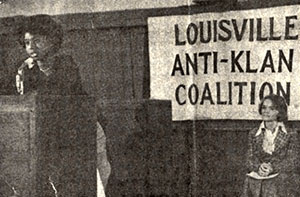Shirley Qahhar
‘Even in her death, she was organizing’
By
Sharon Danann
Cleveland
Published Jul 16, 2010 9:07 PM
Shirley Qahhar, a long-time community activist, passed away on June 9 in
Cleveland.
Bert Jennings of the Carl Stokes Brigade, a militant Cleveland group, told
Workers World, “Shirley was an ardent opponent of the mistreatment of
poor people, dedicated to working for solutions in the communities. She will be
sorely missed.”
Shirley Jean Smith was raised in St. Louis where she was propelled into
activism when police shot and killed an 80-year-old woman whom they were in the
process of evicting. She became a leader in the St. Louis chapter of the
National Organization for Women and a member of the Socialist Workers
Party.
The activist moved to Louisville, Ky., where she represented the SWP and
Louisville NOW in the Anti-Klan Coalition, which was being formed by Abdul
Qahhar, then a leader of the Black Panther Party. The coalition included the
Communist Party, the Reparations Party, the Southern Christian Leadership
Conference, the NAACP and other local organizations.
Brother Qahhar told this writer: “The Anti-Klan Coalition held the
biggest rally Louisville had seen to that point [with] 500-600 people. The
white supremacists were preparing for war. The rally was held in the Labor
Temple, a union hall, and racist white workers were outside picketing the
building. A comment had been made about insufficient government funds. Shirley
got up and said the funds were not insufficient for the war abroad. The
Louisville paper quoted her. She was always at the forefront, always
leading.”
After Shirley and Abdul Qahhar got married in a Muslim ceremony in September
1976, she returned to her job at a DuPont factory. She was the only woman and
sole African-American worker in a chemical loading-and-unloading department
where she faced relentless harassment.
Upon returning to work, she found that her name was written as “Shirley
Khomeini.” When she asked her union’s Human Rights Committee for
support, she was told, “We can’t believe you waited this
long.” The Anti-Klan Coalition showed solidarity with the Qahhars by
protesting this racist, anti-Muslim attack.
Shirley Qahhar also launched the Black Market Bookstore in Louisville. Its
slogan was “Read — it ain’t illegal yet.”
In 1987 the Qahhars moved to Cleveland where Shirley wrote articles for the
East Side News, a progressive newspaper. One important article was her
interview with Susan Robeson, granddaughter of Paul Robeson.
The activist won the Journalist of the Year award in 1990 for her article on
Arnold Feckner, a drug dealer whom the police were paying to supply the Morris
Black housing project with cocaine. Her exposé blew the case wide open and
led to widespread protests. Feckner was convicted, but a pro-police judge
acquitted the cops.
On June 18 Shirley Qahhar’s funeral (janazah) harmoniously brought
together people from many perspectives, who offered prayers, poetry, songs,
stories and loving wishes. Abdul Qahhar’s son, Ibrahim, who led the
service, commented that “even in her death, she was
organizing.”
Khalid Samad of Peace in the Hood, a youth-oriented community group, told of
Shirley Qahhar’s tireless organizing for a conference on the African
Holocaust held in Cleveland 20 years ago. Although the conference focused on
the question of “Who are we?,” Samad said that she refocused the
discussion by asking, “What are we going to do?”
Art McKoy, founder of Black on Black Crime Inc., a Cleveland activist
organization, said that he gave Shirley Qahhar the nickname “the
bodyguard,” as she was known for her perception and quick thinking.
Her spouse and comrade Abdul Qahhar said that, although he is officially the
chairperson of the Cleveland chapter of the New Black Panther Party, Shirley
was the real chairperson, in that she would let him know if his statements were
on the mark or not.
After the funeral, he told this writer that, “The service expressed all
that she was — her communalism, socialism, communism, Black Nationalism,
Islam and pro-humanity.” Moreover, he said, “When you live as a
revolutionary, you die a revolutionary.”
Articles copyright 1995-2012 Workers World.
Verbatim copying and distribution of this entire article is permitted in any medium without royalty provided this notice is preserved.
Workers World, 55 W. 17 St., NY, NY 10011
Email:
[email protected]
Subscribe
[email protected]
Support independent news
DONATE


